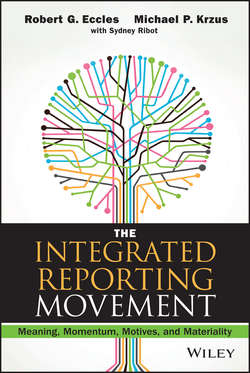Читать книгу The Integrated Reporting Movement - Eccles Robert G. - Страница 8
На сайте Литреса книга снята с продажи.
Chapter 1
South Africa
The Uniqueness Of South Africa
ОглавлениеThe particularity of South Africa's circumstances begs the question of how much momentum the country's decision has created for the adoption of integrated reporting on a global basis. One might suppose the adoption of integrated reporting by a midsized country (population of 51 million in 2012)7 with a divisive history says little about the integrated reporting movement's prospects for the rest of the world. It is unlikely that a developed country would be motivated by the same set of reasons to improve its corporate governance.
As the increased trust thought to accompany integrated reporting could signify easier entry into foreign markets directly, through joint ventures, or through acquisitions, however, other developing countries may have similar incentives to attract foreign investors and make their large companies credible players on a global stage.8 Although this suggests integrated reporting can play a role in establishing the legitimacy of the State and its economy in times of turmoil and change, it certainly does not mean that it always will. In countries where the legitimacy of the State and its business community are more secure, companies and countries may see fewer benefits of integrated reporting – particularly when taking into account its costs and risks.
Yet, while South Africa's unique circumstances may have led it to be the first country to adopt integrated reporting, one could argue, as South Africans Mervyn King and Leigh Roberts have in Integrate: Doing Business in the 21st Century,9 that the underlying forces that put integrated reporting on the agenda are the same worldwide. Central to the development of South Africa's code of corporate governance, King now occupies a similar role on the global integrated reporting stage as Chairman of the International Integrated Reporting Council (IIRC). As a member of the Integrated Reporting Committee of South Africa (IRC of SA) and the Technical Task Force of the IIRC, Roberts was deeply involved in the development of integrated reporting in South Africa. They see integrated reporting as one of “four corporate tools” to manage companies in a changing business environment. “Integrated thinking” is suggested as the most important, with the other two being stakeholder relationships and good corporate governance.10 We will discuss the relationship between integrated reporting and integrated thinking in detail in the next chapter, “Meaning.”
While the analysis of King and Roberts would suggest that integrated reporting is as relevant elsewhere as in South Africa, exactly how its adoption might best be aided remains unclear. The authors' four tools, much like the five forces they cite as changing the investor environment, are useful to companies all over the world even as their strength varies by country.11 The nine problems with corporate reporting they identify are similarly applicable.12 The remaining instrumentalist questions are concerned with scope and strategy. Should the focus be on improving corporate reporting per se, which is how it is largely being defined in other countries? Or should integrated reporting be part of a larger context, such as a code of corporate governance, as it was in South Africa? What is the right combination of market and regulatory forces? The South African strategy was what might be called “soft regulation” due to the “apply or explain” basis and the central role of the JSE, in contrast to the hard regulation of a pure mandate supported by the country's securities commission. These questions will be addressed in our final chapter. Here, we present South Africa's particular journey in order to glean what can be learned from the only country in which integrated reporting is mandatory.
7
“Statistical Release for Census 2011 (embargoed until October 30, 2012).” Published by Statistics South Africa for the South African government, Private Bag X44, Pretoria 0001. Population was 51,770,560 people as of 2011. P0301.4. http://www.statssa.gov.za/publications/P03014/P030142011.pdf, accessed February 2014.
8
Empirical studies have shown that better corporate governance is highly correlated with better market valuation and operating performance, for example: Klapper, Leora F. and Inessa Love. “Corporate governance, investor protection, and performance in emerging markets.” Journal of Corporate Finance 10, no. 5 (2004): 703–728.
9
King, Mervyn and Leigh Roberts. Integrate: Doing Business in the 21st Century, by Cape Town: Juta and Company, Ltd., 2013.
10
Ibid., pp. 40–44. The five forces are growing investor power supporting sustainability issues, requirements of large corporate customers for more sustainable business practices in their suppliers, increasing regulation on societal issues, pressures on companies from governments to deal with poverty and growing social inequality, and the need to reduce the waste of diminishing natural resources.
11
Ibid., pp. 5–9.
12
Ibid., pp. 16–22. The problems are: (1) too heavy for the postman, (2) yesterday's story, (3) not the whole story – the financial pictures only, (4) not the whole story – some intangibles are excluded, (5) not the whole story – some costs are excluded, (6) different reports for different users, (7) nonfinancial information is not considered mainstream by all, (8) reporting influences behavior, (9) short-termism, (10) reporting is behind the technology curve, and (11) no common system for preparing the annual report.
